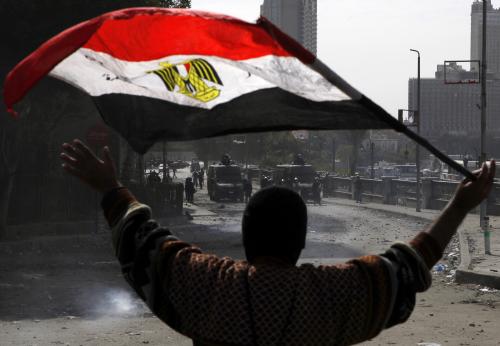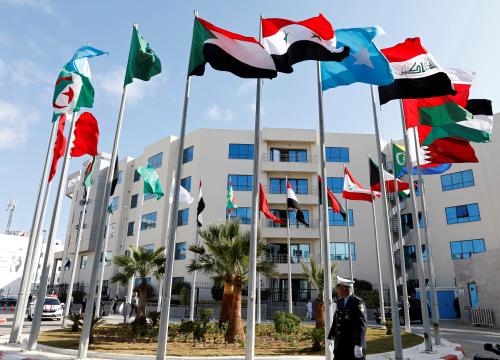To the Lebanese-American author Nassim Taleb almost all major discoveries and historical events are “black swans.” These very rare, extremely impactful events initially come as a surprise, but once they occur, they are often inappropriately rationalized with the benefit of hindsight. For Taleb, historical events such as World War I and September 11 are some examples of black swans. In his view, these outliers explain almost everything that followed as they changed the course of history.
The Arab Spring surely satisfies the three criteria for a black swan event: surprising, historically consequential, and rationalized by hindsight. First, its onset, triggered by the self-immolation of a Tunisian street vendor, caught the world by surprise. Most Arab states had been thought to be more stable than other developing countries (Figure 1). Political dissent and instability were suppressed by longstanding autocratic governments (Figure 2). Standard indicators normally used to track economic performance did not capture the brewing discontent. Instead, they presented a favorable picture of development, with low and declining poverty rates, moderate and stagnant inequality, and increased access to education and health services. To most observers, the fragility of the Arab state was masked, although hidden risks had been accumulating for years.
Second, just as in the case of other black swans, the Arab Spring’s impact was massive. In Egypt, Libya, Tunisia, and Yemen, the uprisings overthrew authoritarian governments and launched a period of difficult transitions. In Syria, Libya, and Yemen, the rebellions turned into prolonged civil wars with devastating consequences for civilians. The spillover effects of the post-Arab-Spring wars have been felt in neighboring countries, other countries in the Middle East and North Africa, and beyond.
Figure 1. Political instability index, 2000-2012
Source: Ianchovichina (2018).
Third, many explanations for the Arab Spring emerged after the fact. Some of the explanations put forward were high economic inequality, the rising expectations of young people, a squeezed middle class, high food prices, lack of inclusion, and the list goes on. But since we know that this type of event is often inappropriately rationalized, it is important to ask which factors were the real reason for the Arab Spring. This will help find appropriate ways for countries to overcome their longstanding issues and set the stage for peace and sustainable development.
Eruptions of Popular Anger, my recent book on the economics of the Arab Spring and its aftermath, focuses on ruling out some of the alternative explanations using empirical evidence. From a regional perspective, I examine how economic factors fit into the Arab Spring narrative. The aim was not to present a comprehensive account of the entire event across every country. (Many “known unknowns and unknown unknowns” remain.) Rather, I focus on common factors that matter to different degrees in all countries and on those that truly mattered for change in the region—looking at both the demand side, exploring the frustration and sources of popular anger, and the supply side, the mix and quality of governance institutions for security.
Figure 2. Voice and accountability and GDP per capita, 2010
Source: Ianchovichina (2018) based on Worldwide Governance Indicators Database.
As appropriate in the case of an extreme event, in which the probability was significantly underestimated in the standard economic data, my analysis employs an eclectic mix of new or less-frequently-used data as well as new methods appropriate for analysis in data-deficient settings. The empirical investigation rules out high and rising inequality as a reason for the Arab Spring uprisings. It shows that the real problem was a broken social contract, which led to the erosion in the quality of life for the middle classes. The young, educated, middle-class urban residents struggled to find good quality jobs. They were unhappy about the poor quality of public services and frustrated by the need for connections to powerful elites to do well.
The old social contract, which had delivered development results in the past and under which Arab governments provided public-sector jobs and subsidized services in return for subdued voice, was failing. It was also fiscally unsustainable. At a time when the public sector could no longer be the employer of choice, the private sector did not generate enough formal sector jobs because of distortions that limited economic inclusion, competition, and incentives and opportunities for private investments. The breakdown in the social contract led to the so-called “unhappy development” paradox of increasing dissatisfaction with life despite moderate-to-rapid development (Figure 3). It also increased the premium on freedom, creating impetus for political change.
Figure 3. Unhappy development in the Arab spring countries
Source: Real annual GDP per capita data from the World Bank World Development Indicators and percent of satisfied individuals in total population from Dang and Ianchovichina (2016) based on data from Gallup World Poll). The Arab Spring countries include Tunisia, Egypt, Syria, and Yemen.
In the aftermath of the Arab Spring, deep regional, ethnic, and sectarian divisions in countries without well-developed governance institutions for power sharing and fair dispute resolution set the stage for intense political violence. The ongoing wars remind us that the Arab Spring has drastically changed the Middle East and North Africa. In the countries where stability has returned, the Arab Spring is felt through reforms undertaken to improve the fiscal situation and address the structural issues that led to the economic decline in the first place. Promoting private-sector development and economic inclusion is a top priority for governments across the region. Yet, it is important not to forget that improving transparency, accountability, and the voice of the public is also crucial. Repressing voice to achieve stability could set the stage for another black swan in the Middle East and North Africa.
The Brookings Institution is committed to quality, independence, and impact.
We are supported by a diverse array of funders. In line with our values and policies, each Brookings publication represents the sole views of its author(s).








Commentary
Was the Arab Spring a black-swan event?
March 28, 2018